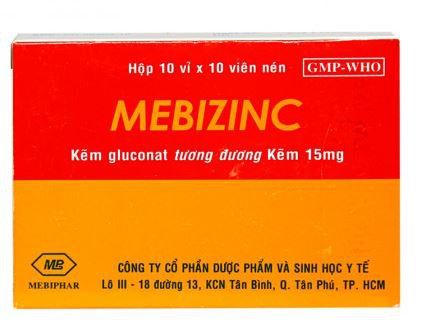This is an automatically translated article.
Zinc interacts with important hormones to help bone growth and height. However, many parents still do not fully understand the role and how to properly supplement zinc to increase height, leading to deficiency or excess, negatively affecting the development of children.
1. Does zinc supplement help increase height?
As we know, zinc is an important mineral for our body. Zinc participates in the construction of enzymes - catalysts for many reactions in the body. Zinc helps to increase absorption, increase protein synthesis, participate in the process of cell division, increase appetite...
For children, zinc deficiency can delay height growth, development disorders bones, causing delay in puberty, causing anorexia due to taste disturbances.... This condition, if prolonged, will make children malnourished, which will eventually affect growth and development.
In addition, zinc also cooperates with important hormones involved in bone growth - an essential factor to help children increase height. In addition, zinc can increase the effect of vitamin D on bone metabolism by stimulating DNA synthesis in bone cells.
Referring to bones, height, many of us only think of Calcium or Collagen type II without knowing that zinc is also an important component in bone structure. The fact that parents add enough calcium but do not pay attention to zinc, children may be stunted, and have limited growth and development.
Zinc supplementation helps to increase the body's ability to absorb nutrients, increase appetite, help children eat more, the body is supplemented with diverse nutrients, both beneficial for health and improving height quickly fast. Lack of zinc, the process of cell division is unlikely, thereby inhibiting height growth and adversely affecting health.
Zinc participates in the activation of aminoacyl - tRNA synthetase in osteoblasts and the synthesis of cellular proteins, inhibiting bone resorption. As a result, zinc not only preserves bone mass effectively, but also helps increase bone density, making bones strong.
To supplement zinc to increase height for children, parents need to give their children zinc when they are hungry, to avoid causing digestive disorders. Zinc should not be used with minerals such as calcium, iron and magnesium and should be taken away from the time of using other vitamins.

Giải đáp kẽm có giúp tăng chiều cao?
2. How does zinc interact with growth hormones in children?
Zinc participates in the composition of more than 300 enzymes in the body. Is an indispensable catalyst of RNA - polymerase, plays an important role in DNA replication and protein synthesis. Therefore zinc interacts with growth hormones in children by increasing cell division, promoting growth. Therefore, if zinc deficiency, cell division will not occur normally, so it seriously affects the growth and development of children, causing malnutrition and stunting. In addition, zinc is also involved in the biosynthesis and regulation of the function of the hypothalamic hormone axis such as: GH (Growth hormone), IGF-I (Insulin-like growth factor 1-Insulin-like growth factor 1). ) are growth hormones in children. Many studies have shown that zinc plays a role in promoting children's height growth through IGF-I.For immunity, zinc also helps to develop and maintain the effective functioning of the immune system, necessary for the body's defense against disease, and for wound healing. Zinc deficiency impairs development and function of most immune cells, including T cells, B cells, and macrophages. In zinc-deficient mice, there was also hypoplasia of the spleen and thymus and decreased production of immunoglobulins, including IgA, IgM and IgG.
Macrophage activation and impaired phagocytosis were also observed in both zinc-deficient laboratory animals and children. Therefore, zinc deficiency compromises immune function, increases the risk of infectious diseases, thereby reducing the growth and development of children, increasing the risk of malnutrition and death in children.

Kẽm có vai trò thúc đẩy tăng trưởng chiều cao của trẻ thông qua IGF-I
3. Micronutrients help increase height for children
In addition to zinc, there are many important micronutrients that can help children grow taller, including:
Vitamin A, iodine, iron Vitamin A is a micronutrient that is essential for vision, differentiation about cells, the function of the immune system and support the process of creating bone cells. Meanwhile, iodine is an essential trace element to prevent goiter and mental retardation. During the growth phase, the body will have to rely heavily on iron. Iron helps to transport oxygen to the body's cells... Iron-rich foods include red meat, seafood, beans, dark green vegetables, and iron-fortified foods.
Calcium Calcium-rich foods can be mentioned such as milk, cheese, dairy products, dark green vegetables, soybean products, fish... Recently on the market, many foods have increased. other calcium supplements such as bread, biscuits, orange juice, instant cereals.... Calcium can be considered as the most important trace element in bone development and height increase of children. Daily calcium requirement for children under 6 months old is 300 mg, 6 - 11 months old is 400 mg, 1-2 years old is 500 mg, 3 - 5 years old is 600 mg. Pregnant and lactating women have the highest calcium requirements, which are 1,200 mg and 1,300 mg.
Children 3 to 5 years old should have 4 units of milk and dairy products per day. One unit contains 100 mg of calcium found in one cheese (15g) and 100ml yogurt (one yogurt), 200ml liquid milk (2 small milkshakes).
Vitamin D In fact, in nature, there are very few foods that contain a lot of vitamin D. Some types of cod liver oil, especially fatty fish, liver and fat of marine mammals, raised eggs. , contains vitamin D. In 100g of carp contains 24.7 mcg of vitamin D, 100g of salmon contains 10.88 mcg of vitamin D, egg yolk has 2.88 mcg per 100g.
Vitamin D helps the body to increase calcium absorption, strengthen bones and good growth. Therefore, children need to increase outdoor exercise and supplement with foods rich in vitamin D and calcium.
In addition to the effect of height growth, these micronutrients also enhance immunity for children with stunting malnutrition.
Besides supplementing with micronutrients, getting enough sleep and maintaining regular exercise are also essential in contributing to the body's metabolism and helping to increase height for children.
Children's sleep should be ensured as follows:
For children in the period from birth to 3 months old, they need to sleep enough from 14 to 17 hours a day; Babies from 3 to 11 months old need 12-17 hours of sleep; Toddlers 1 - 2 years old need 11 - 14 hours of sleep every day; Children aged 3 - 5 years need 10 - 13 hours of sleep per day; Children from 6-13 years old need 9-11 hours of sleep every day; Teenagers aged 14 to 17 need eight to 10 hours of sleep a day; Adults aged 18 - 64 years need 7 to 9 hours of sleep; Elderly people aged 65 and over need 7 to 8 hours of sleep every day. Children at school should get at least one hour of exercise or sporting activity each day. Exercising in adulthood will also have its benefits. In addition to helping maintain overall health, it may also help reduce the risk of osteoporosis. This condition occurs when bones become increasingly weak or brittle, leading to a loss of bone density. This can cause the height to decrease. To reduce your risk, try walking, playing tennis, or doing yoga a few times a week.
In summary, zinc affects children's height in many ways, such as increasing appetite to help children eat more, supplementing with a variety of nutrients for physical development, zinc participating in biosynthesis. and regulate the function of the hypothalamic hormone axis, such as GH (Growth hormone), IGF-I are growth hormones and stimulate height growth in children.
In addition to zinc, parents also need to supplement their children with other important vitamins and minerals such as lysine, chromium, B vitamins,... errands.
Please regularly visit Vinmec.com website and update useful information to take care of your baby and family.













